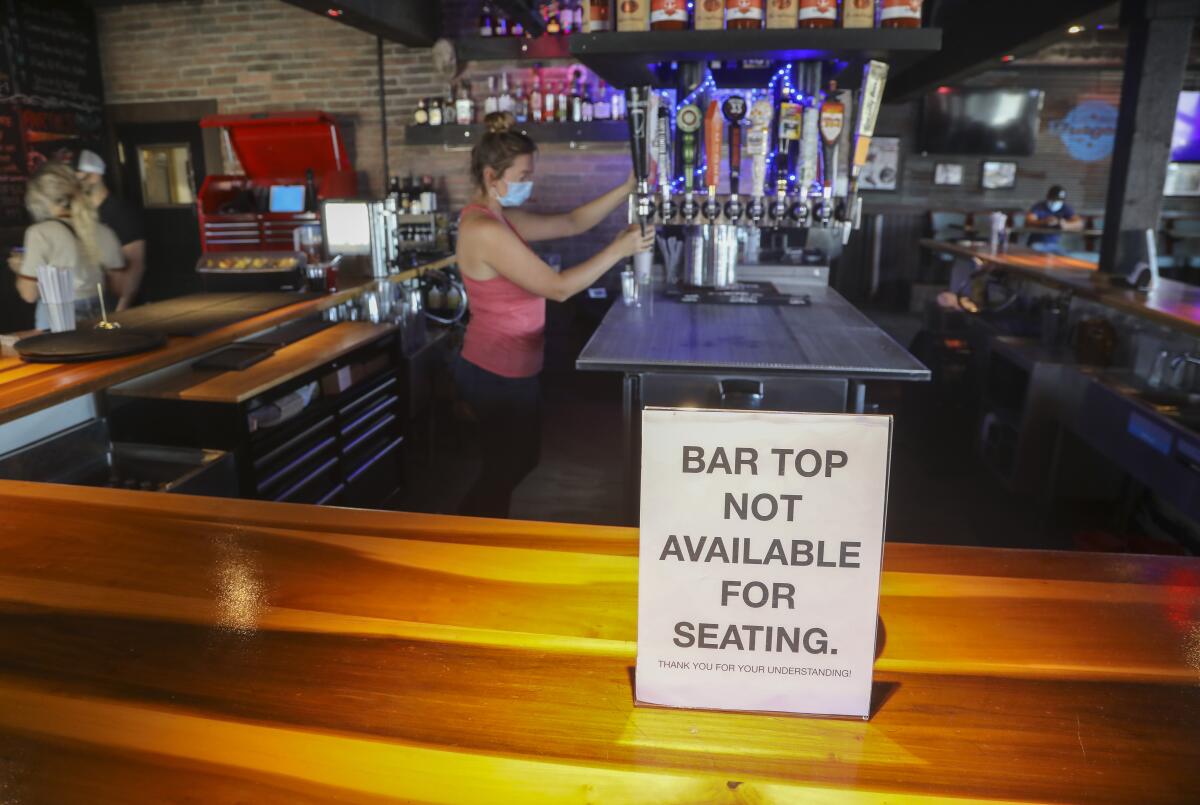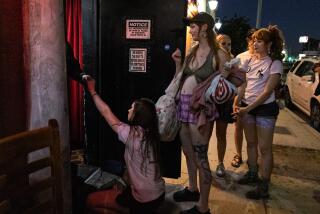San Diego judge allows strip clubs to stay open, indicates restaurants could also reopen

SAN DIEGO — A San Diego County Superior Court judge ruled Wednesday that two strip clubs can remain open and operating during the most recent COVID-19 shutdown orders from the state, a decision that appears to extend to the county’s beleaguered restaurants and allow them to reopen to some extent.
The ruling by Superior Court Judge Joel Wohlfeil came in a case filed by two San Diego strip clubs. And while the clubs prevailed in earning an injunction that allowed them to continue to offer live dancing, the judge went a significant step further and said the injunction can apply across San Diego’s restaurant sector, which has been crushed by the COVID-19 pandemic.
Wohlfeil’s ruling prevents local officials from enforcing the latest set of restrictions that went into effect in San Diego County on Dec. 3, not only against the two strip clubs — Pacers and Cheetah’s — but also “San Diego County businesses with restaurant service” that abide by health and safety protocols that “are no greater than is essential” to control the spread of COVID-19.
The ruling is effective immediately. What it means, however, is unclear.
“The state and the county are analyzing the scope of the ruling and discussing next steps, which includes seeking clarity from the court,” county Communications Director Mike Workman said in a statement. “Until we have clarity, we have suspended enforcement activities against restaurants and live entertainment establishments.
“With record numbers of new infections, deaths and ICUs at capacity, we want to remind everyone to do your part. Please don’t gather, [but do] socially distance, wear a face covering and wash your hands.”
The county’s COVID-19 metrics put it in the state’s tier of “widespread” infection, and triggered a mandated closure or operating restrictions on many businesses. Restaurants are allowed to offer only takeout food, with no indoor or outdoor dining allowed.
Wohlfeil’s order seems to peel back those restrictions, but to what extent is unclear.
The judge said there was no compelling evidence that allowing restaurants to operate, with health and safety restrictions, adds to the risk of spreading COVID-19.
While he said he was empathetic to county leaders put in position to enforce state health orders or risk losing government funding, he also said the businesses were vital.
“These business establishments provide sustenance to and enliven the spirits of the community, while providing employers and employees with means to put food on the table and secure shelter, clothing, medical care, education and, of course, peace of mind for they and their families,” he wrote.
The ruling constitutes a sharp rebuke to the sweeping stay-at-home orders that limit or shut down businesses and entire sectors of the economy. Gov. Gavin Newsom and local leaders have said those restrictions were necessary as a surge in COVID-19 infections and hospitalizations is swamping the state, straining healthcare systems.
It came on a day when San Diego County reported 2,807 new cases of infection and an additional 23 deaths, with 301 patients in intensive care beds. Hospitals are starting to curtail procedures such as organ transplants and cancer surgeries because of the strain on the system, county officials said Wednesday.
Restaurant staffers reacted with cautious optimism to a ruling they think may give them the green light to reopen for indoor and outdoor dining.
“The overall category in the ruling is ‘businesses with restaurant service,’ and I think Cowboy Star is a business that provides restaurant service,” said Jon Weber, co-owner of Cowboy Star in downtown San Diego. “You could read the ruling a couple of different ways, depending on your bias. At Cowboy Star, we’re going to keep doing what we’ve been doing, which is takeout. We’re not making any decisions tonight.”
Cowboy Star was one of the plaintiffs in a lawsuit, filed last month on behalf of San Diego County restaurants and gyms seeking a temporary order that would have immediately let them return to indoor operations. Superior Court Judge Kenneth J. Medel, however, turned down their request, siding with county and state officials, who were the defendants in the case.
Chad Cline, co-owner of the Waterfront Bar & Grill as well as other venues, said Wednesday that he hopes the ruling means he can reopen his businesses to dining but is unsure precisely what Judge Wohlfeil’s wording means.
“It kind of says that restaurants can reopen but the caveat there may be that someone has to be stripping, which seems so wild to me,” Cline said. ”If that’s what it takes for us to reopen our businesses — taking off our clothes, I’ll do it.”
For the two strip clubs, the ruling was a significant win. On Nov. 6 Wohlfeil had issued a temporary injunction allowing the clubs to remain open. His latest ruling extended that while the suit brought by the clubs against the orders continues.
In that earlier ruling Wohlfeil sided with the clubs, which argued that live adult dancing has been recognized as constitutionally protected free speech by courts, and said the restrictions posed an “irreparable harm” to the businesses.
Jason Saccuzzo, the lawyer for Pacers, said he was happy with the ruling, adding that if it applied to other businesses that was fine. “Clearly, it applies to us, and if other businesses look at it and want to run with it, that’s their decision. We fully support all restaurant owners and if our little case does anything to help them out, that’s great.”
Moran and Weisberg write for the San Diego Union-Tribune.
More to Read
Sign up for Essential California
The most important California stories and recommendations in your inbox every morning.
You may occasionally receive promotional content from the Los Angeles Times.












